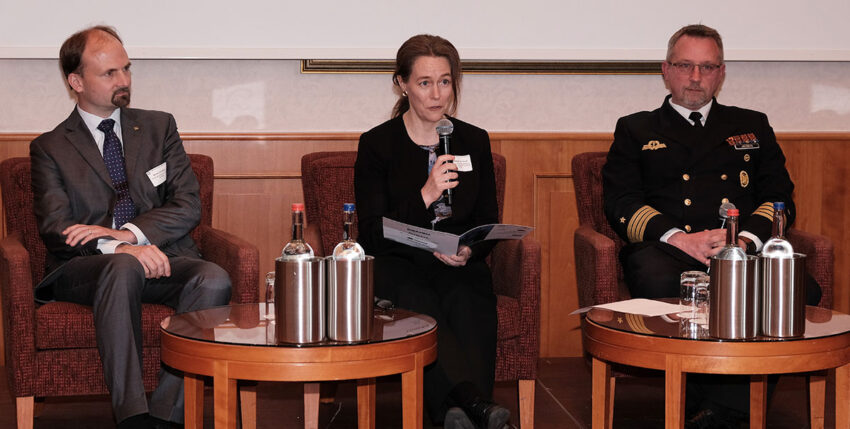[et_pb_section fb_built="1" _builder_version="4.16" global_colors_info="{}"][et_pb_row _builder_version="4.16" background_size="initial" background_position="top_left" background_repeat="repeat" global_colors_info="{}"][et_pb_column type="4_4" _builder_version="4.16" custom_padding="|||" global_colors_info="{}" custom_padding__hover="|||"][et_pb_text _builder_version="4.19.5" background_size="initial" background_position="top_left" background_repeat="repeat" hover_enabled="0" global_colors_info="{}" sticky_enabled="0"]
With the title "Rediscovered - the northern flank area", the German Maritime Institute (DMI) once again attracted experts, interested parties and trade visitors to the Hotel Atlantic in Wilhelmshaven this year. This was the ninth time that the organisers had repeated the now prominent format, which is made possible together with griephan, the German Navy's Operational Flotilla 2, the German Armed Forces Association (DBwV), the German Naval Association (DMB) and the German Atlantic Society. And that is why the Lord Mayor Carsten Feist did not miss the opportunity to personally convey the city's greetings on 24 May. With his usual humour and undisguised pride in his city, he summed up the importance of Wilhelmshaven for the energy transition in Germany and the future of goods traffic by sea. Olaf Scholz mentioned Wilhelmshaven four times in his government statement, but Berlin only once, he claimed. And self-confidently, he indirectly called out to his Hamburg colleague that the role of the Jade city should finally be accepted. The competition is not here, but in Rotterdam. At the end, he promised good weather - a humour that can only be understood by "Schlicktown connoisseurs".
Professor Robin Allers from the Norwegian Institute for Defence Studies in Oslo gave the keynote speech. The "Hamburg native with a Nordic perspective" - as he called himself - described the significant changes on the northern flank as a result of the war in Ukraine. He regretfully announced that there would no longer be any bilateral contacts or cooperation. He defended Norway's often-criticised attempt to maintain some normality, at least in the fishing industry, on the grounds that Norway did not want to let the thread break. He concluded that Norway's importance on the northern flank had grown, but that the main North Sea partner was still to be found in the UK - not Germany, even though the German signals had clearly been heard. He cited the 2025+ target structure and referred to defence cooperation.
The first panel - moderated as usual by the charmingly confident Heinz Schulte - was opened by Mathias Lüdicke, Branch Manager of "Niedersachsen Ports". He described the extensive changes that are currently taking place in Wilhelmshaven. He focussed in particular on the developments in infrastructure for the energy transition and the importance of protecting maritime facilities.
Against the backdrop of the Nord Stream events and the topicality of the issue of critical infrastructure at sea, the presentation by Frank Görke from the Bad Bramstedt Federal Police Directorate was eagerly awaited. And the Chief Police Director hit the nerve of the audience: he emphasised the role of the Federal Police ("worldwide"), the new "maritime awareness", the cooperation between the authorities, the new level of cooperation with the German Navy and the requirements for a situation picture and clear responsibilities. He clearly emphasised that a new era had dawned with the new "Güben" class operational vessels. With a clearer presence and the ability to hold out, "robust prevention work" is also possible thanks to the on-board gun, among other things. The presence of several high-ranking officers from the Federal Police Sea was a strong signal of the willingness of the authorities to co-operate at sea.
Henrik Schilling from the Institute for Security Policy at the University of Kiel (ISPK) posed the question of "who holds the wheel" and looked at international responsibilities and coastguards. Using France, Great Britain and Denmark as examples, he discussed the organisation and coordination of sovereign tasks in the coastal area.
The second panel was moderated by Dr Sarah Kirchberger from the ISPK, Vice President of the DMI. The series was opened by Carl Phillip Wrede from the German Aerospace Centre (DLR), who described the ever-increasing dependence on maritime infrastructure. DLR operates the "Institute for the Protection of Maritime Infrastructures" in Bremerhaven, which was founded in 2017. His statement "Germany is still sea-blind" was readily confirmed by those present.
The series was concluded by Captain Dirk Jacobus from the Rostock Naval Command. For him, "Seabed warfare" is not a new dimension, it is rather a new attention. For the navy, which is experienced in underwater warfare, there are now enormous expectations, although there is no clear definition and the term needs to be "sharpened". He openly stated that military capabilities should not be confused with military competences. And he clearly stated that Russia already had an idea of how they could threaten us. In conclusion, he called for more pragmatism in order to achieve more more quickly.
As the closing panel also noted, all participants "took a great deal away" from this high-calibre event. The President of the DMI, Rear Admiral Karsten Schneider, expressed his satisfaction with the course of the event and the high level of expertise, even if many security issues were still unresolved.
The ninth event of this kind also lived up to its high standards. Some of the presentations will appear in the next issues of "marineforum".
[/et_pb_text][et_pb_gallery gallery_ids="29516,29517,29519,29520,29522,29524,29527" posts_number="7" _builder_version="4.19.5" _module_preset="default" global_colors_info="{}"][/et_pb_gallery][/et_pb_column][/et_pb_row][/et_pb_section]










